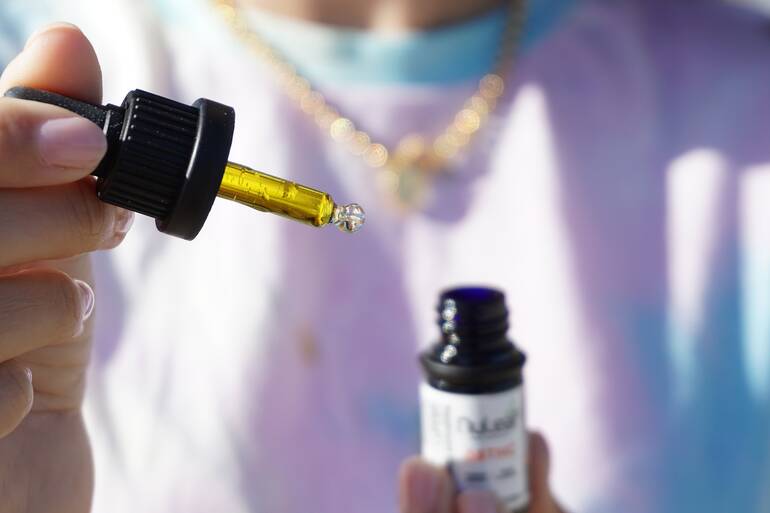Start 14-Day Trial Subscription
*No credit card required

Do Delta-8 Tinctures Have Side Effects?
Delta 8 is one of the fastest-growing cannabinoids in the world. It’s a milder, less potent version of delta 9 THC, the cannabinoid renowned for making users high. Although delta-8 is also intoxicating, it’s described as being half as potent as D9, producing a relaxing, mellow, and pleasant high.
Delta 8 also has some therapeutic effects, such as the potential to relieve pain, improve mood, and minimize stress, though more scientific research is needed on its health properties. Nonetheless, many regard the cannabinoid as the ideal middle-ground between delta 9 and CBD.
Like CBD, delta 8 is available in various forms, including gummies, capsules, vape pens, and tinctures. Tinctures, such as this delta 8 tincture 1000mg from PureKana, are especially popular because they’re versatile, come in varying strengths and flavors, and are easy to customize to your needs.
However, since delta 8 is new, many people are wary of the cannabinoid and its potential side effects. Keep reading if you want a little more insight before buying a delta 8 tincture.
What Is a Delta-8-THC Tincture and What Are Its Effects?
Delta 8 THC is one of the hundreds of chemical compounds in the cannabis plant. It’s not nearly as famous – or abundant – as delta-9 THC and cannabidiol (CBD) but is gaining increasing recognition for producing a mild, uplifting, and enjoyable high.
Delta 8 is a minor cannabinoid only found in tiny concentrations in the cannabis plant. Since naturally occuring delta 8 is so rare, most manufacturers create synthetic D8 in a laboratory, using hemp-derived CBD as the raw material. The CBD is converted into delta 8 using strong acids and special equipment.
Once the delta 8 extract is perfected, it’s used to craft various D8 products. A delta 8 tincture is a concentrated liquid extract made by diffusing a D8 distillate into a liquid base - usually MCT oil or hemp seed oil. Like CBD oil, delta 8 tinctures come in varying potencies and flavors.
Primarily, people opt to use a delta 8 tincture for recreational purposes since it can produce a high. But since the high is much milder than that of D9, it’s a useful option for those looking for a subtle, clear-headed high that still enables them to function.
Moreover, delta-8 may be calming, helping users relax and improve sleep. It may also support pain management.
Do Delta 8 Tinctures Have Side Effects?
There aren’t many studies that analyze the safety profile of delta 8 THC. However, like most cannabinoids, some potential side effects are linked to delta 8 products.
In general, the possible side effects of a delta 8 tincture are similar to those linked to delta 9 THC.
- Dry and/or red eyes
- Dry mouth
- Lightheadedness
- Low blood pressure
- Elevated or slower heart rate
- Nausea, diarrhea
- Temporary memory loss
- Trouble with body coordination and thinking
Consuming untrustworthy delta 8 tinctures drastically increases the risk of side effects since products could be contaminated with harmful substances like heavy metals, mold, and pesticides.
Naturally, the risk of side effects is higher when you overconsume delta 8 THC. However, the biggest risk of delta 8 is that it's unregulated. This means that safety, potency, and purity aren’t guaranteed.
Consuming untrustworthy delta 8 tinctures increases the risk of side effects drastically since products could be contaminated with harmful substances, like heavy metals, mold, and pesticides.
How to Minimize the Risk of Side Effects
Since delta 8 is mainly produced synthetically, and the market is largely unregulated, it leaves much room for contamination. you must conduct detailed research to find trustworthy and reputable delta 8 retailers.
Third-party lab reports are key to assessing the purity, potency, and safety of a delta 8 tincture. These reports should show the cannabinoid and terpene content, displaying precise quantities. Lab results must also verify that products are tested for the presence of pesticides, heavy metals, and other harmful substances.
Avoid brands that do not publish third-party lab reports. They either don’t send products to an independent laboratory for testing, or lab test results aren’t favorable.
Also, consider brand reputation when assessing a retailer. If the brand has a good standing in the market with a loyal following of happy customers, it’s an excellent sign. Check customer reviews to gauge the quality of a brand and its product offerings.
Finally, also consider that delta 8 tinctures must be used responsibly. It’s best to start with a low dose of D8 – such as 5 - 10mg daily – and increase that amount gradually as needed. When high-quality delta 8 products are consumed in low doses, the risk of adverse side effects is low.
Final Thoughts
The biggest risk of consuming a delta 8 tincture is likely due to lack of regulation, not from delta 8 itself. Since D8 is primarily synthetically produced, it’s difficult to know what’s in it.
Always shop from reputable delta 8 retailers to ensure you use a high-quality product that delivers optimal results. Lab reports are crucial in assessing the purity and safety of a delta 8 tincture. But you should also be mindful of how much delta 8 you consume since overconsumption increases the risk of adverse side effects.



